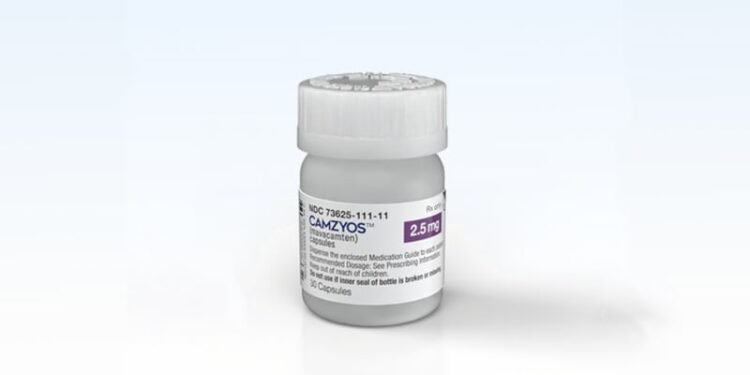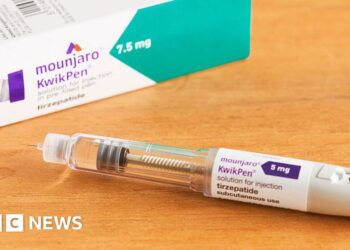MANCHESTER — Mavacamten (Camzyos, Bristol Myers Squibb) continues to show promising results in patients with symptomatic obstructive hypertrophic cardiomyopathy (oHCM), a consultant cardiologist said at the recent British Cardiovascular Society Annual Conference 2025.
William Jenkins, a consultant cardiologist at the Royal Infirmary of Edinburgh, said that real world outcomes mirror those from clinical trials, including EXPLORER and VALOR-HCM.
High Rates of Symptom Improvement
Notably, data from three UK centres showed that about 70%-80% of patients experienced symptomatic improvement with mavacamten treatment. In addition, 90% saw a 30mmHg drop in the left ventricular outflow tract (LVOT) gradient – considered a significant reduction in obstruction.

Although patients initially required “very intense echocardiographic surveillance”, Jenkins said “it gets much easier” after the first few months of treatment.
“I think our reliance upon echocardiography will probably reduce as we get more experience with this,” he told Medscape News UK.
A First-in-Class Therapy
Mavacamten, a cardiac myosin inhibitor, is the first drug of its kind. It works by normalising contractility, reducing dynamic LVOT obstruction, and improving cardiac filling pressures in people with HCM.
“HCM is something that develops over decades,” Jenkins said. “You can develop symptoms early, but you can have those symptoms for a really long time before you go on to develop other things like abnormal heart rhythms, heart failure, or dying suddenly.”
He added that although oHCM is considered rare, many patients could benefit from treatment.
Managing HCM still falls within general cardiology in some centres, Jenkins noted, raising concerns that patients may not be reviewed as frequently as needed.
“People live with it for years and years — if not decades — before they develop any of the end stage features of HCM,” Jenkins said. “They can become very adapted to their symptoms.”
Patient Advocacy and Experience
Hypertrophic cardiomyopathy affects around 1 in 500 people in the UK and US, with about two thirds of cases involving obstruction.
Katharine McIntosh, head of research and policy at Cardiomyopathy UK, told Medscape News UK that mavacamten had been a “cause for excitement” among patients. “It’s the first big cardiomyopathy-specific drug.”
McIntosh expressed frustration at the slow rollout of the drug, which was recommended for NHS use in England and Wales in 2023 and in Scotland in 2024.
“It’s at the point now where one would have thought that everyone who should be on it would be getting onto it. But that’s just not been the case,” she said.
A recent Cardiomyopathy UK survey found that patients who accessed mavacamten were “very positive” about its effects. Respondents described it as “life changing” and felt like they had been given their lives back, McIntosh said.
Challenges Facing Widespread Use
One barrier is that mavacamten must be prescribed and monitored by specialists experienced in treating cardiomyopathies – resources not available at all centres.
Prescribing guidance states that patients require echocardiography before and at regular intervals after starting treatment. Genetic testing for Cytochrome P450 (CYP) 2C19 (CYP2C19) is also needed to guide dosing.
Long-Term Outlook
Jenkins said that three key issues must be considered before prescribing mavacamten:
- Close early monitoring is needed, as the drug can cause left ventricular systolic dysfunction.
- CYP2C19-related drug interactions require pharmacy input.
- Counselling is essential due to potential foetal toxicity risks.
“Most people tolerate this [drug] very well”, he said. After the initial 12-week period, follow-up can be reduced to every 3-6 months.
“This is an indefinite medication for a lot of people” Jenkins said. However, with an estimated annual cost of almost £14,000 per patient, he stressed the need for careful initial use.
“Right now, the indication is for symptomatic, severe LVOT obstruction,” he said. However, “there’s no reason in the long-term why this shouldn’t become first-line”.
Whether mavacamten offers benefit for oHCM patients without obstruction remains unclear.
Jenkins has acted as a consultant to BMS and AstraZeneca. McIntosh had no conflicts of interest to disclose.
Sara Freeman, BSc, MSc, is a freelance medical journalist based in London, UK. She has been reporting for specialist healthcare news organisations for more than 20 years.
Source link : https://www.medscape.com/viewarticle/mavacamten-showing-real-world-success-treating-ohcm-2025a1000fky?src=rss
Author :
Publish date : 2025-06-10 17:41:00
Copyright for syndicated content belongs to the linked Source.







